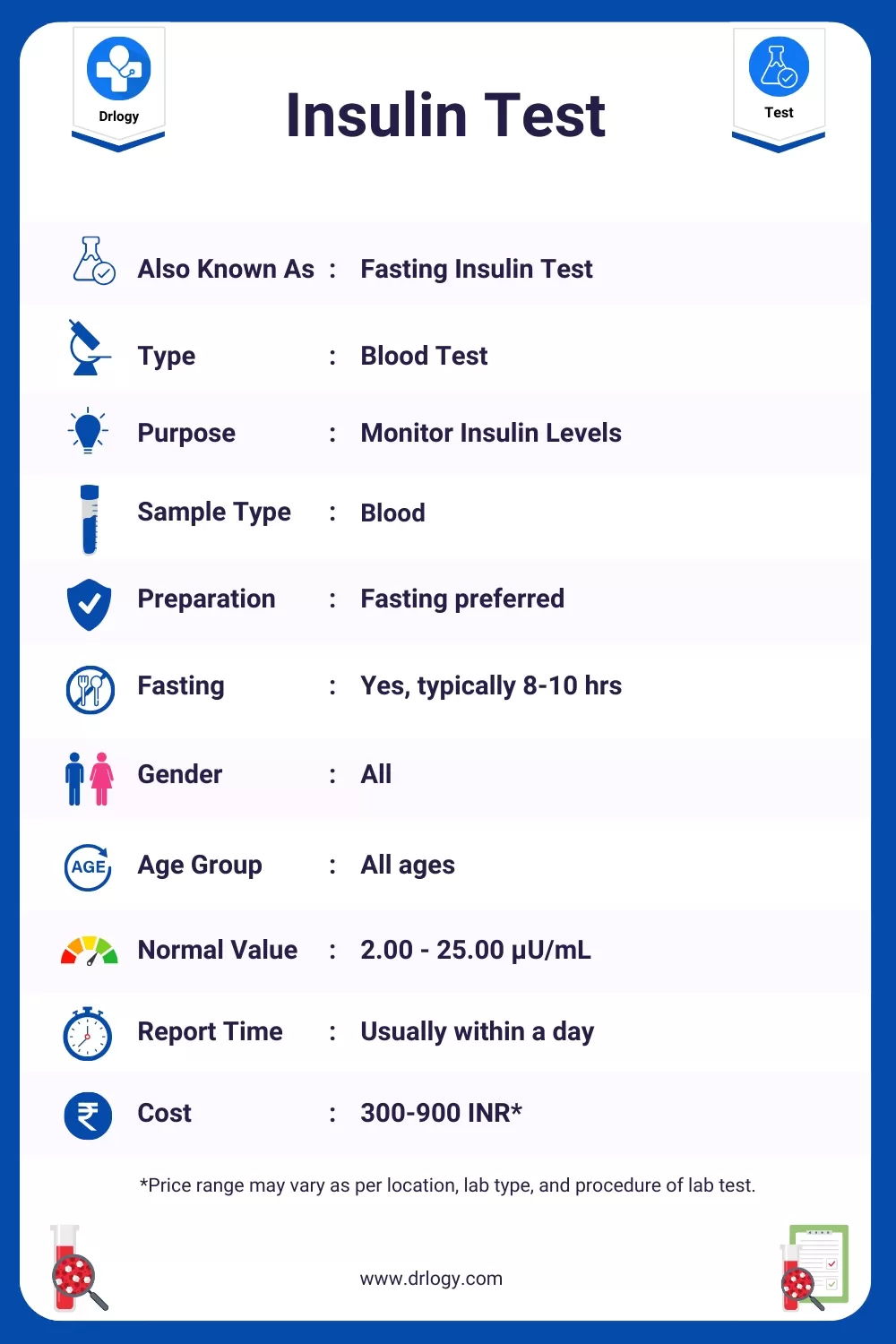
An insulin test measures the level of insulin, a hormone produced by the pancreas that regulates blood sugar. It is used to diagnose and monitor conditions like diabetes and evaluate the effectiveness of insulin therapy.
Here are the basic details of the Insulin Test.
| Also Known As | Fasting Insulin Test |
| Type | Blood Test |
| Purpose | Monitor Insulin Levels |
| Sample Type | Blood |
| Preparation | Fasting preferred |
| Fasting | Yes, typically 8-10 hrs |
| Gender | All |
| Age Group | All ages |
| Normal Value | 2.00 - 25.00 µU/mL |
| Reporting Time | Usually within a day |
| Cost | 300-900 INR* |
*Insulin Test Price range may vary as per location, lab type, and procedure of lab test.
An insulin test is a medical examination that measures the concentration of insulin, a hormone produced by the pancreas.
The purpose of the Insulin Test is to:

Here is the basic preparation for the Insulin Test.
Here is the basic Insulin Test Procedure.
Here is the normal range of the Insulin Test
| Test Name | Normal Range |
|---|---|
| Insulin Test | 2.00 - 25.00 µU/mL |
Here is the Interpretation of the Insulin Test.
| Insulin Level (µU/mL) | Interpretation |
|---|---|
| Less than 2.00 | Low insulin levels, potential hypoglycemia |
| 2.00 - 25.00 | Normal insulin levels |
| Greater than 25.00 | Elevated insulin levels, potential hyperinsulinemia |
Here are the potential causes of high insulin levels.
| CAUSE | EXAMPLES |
|---|---|
| Insulin Resistance | Type 2 diabetes |
| Pancreatic Tumors | Insulinoma |
| Obesity | Metabolic syndrome |
| Certain Medications | Steroids, antipsychotics |
| Hyperinsulinism | Reactive hypoglycemia |
Low insulin levels are less common and can be associated with specific medical conditions. Here are potential causes of low insulin levels.
| CAUSE | EXAMPLES |
|---|---|
| Type 1 Diabetes | Autoimmune condition |
| Pancreatic Insufficiency | Reduced insulin production |
| Hypoglycemia | Low blood sugar levels |
| Malnutrition | Nutrient deficiency |
| Insulin Antibodies | May neutralize insulin |
Here are the specimen requirements for the Insulin Test.
|
Specimen |
Serum |
|
|
Volume |
1 ml |
|
|
Container |
Red-top tube or gel-barrier tube |
|
|
Collection |
Separate serum from cells within one hour of collection. Transfer to a plastic transport tube before shipping. |
|
|
Storage |
Refrigerate or freeze. |
|
|
Sample Stability |
Temperature |
Period |
|
Room temperature |
7 day |
|
|
Refrigerated |
14 days |
|
|
Frozen |
60 days |
|
|
Freeze/thaw cycles |
Stable x1 |
|
|
Causes for Rejection |
Grossly hemolyzed; bacterial contamination; lipemic specimen; icteric specimen; non-serum specimen types |
|
Insulin tests are considered safe and routine diagnostic procedures.
Here is the basic limitation of Insulin Test.
Here are some of the risk factors of the Insulin Test.
Here are the Doctor's recommendations or consult a specialist after the Insulin Test.
| Insulin Test Result | Doctor to Visit | Reason |
|---|---|---|
| High | Endocrinologist | Possible insulin resistance or diabetes |
| Normal | No specific doctor | Results within normal range |
| Low | General Practitioner | Potential pancreatic or hormonal issues |
Here are the estimated Insulin Test Prices in India with different top cities:
|
City |
Price Range (INR)* |
|
300-900 |
|
|
400-900 |
|
|
300-900 |
|
|
400-900 |
|
|
300-900 |
|
|
400-900 |
|
|
300-900 |
|
|
400-900 |
|
|
400-900 |
|
|
300-900 |
|
|
400-900 |
|
|
300-900 |
|
|
400-900 |
|
|
300-900 |
*Prices are approximate and vary depending on a specific laboratory or healthcare facility.
Summary
Overall, Insulin Test is crucial for diagnosing and managing diabetes by evaluating insulin levels in the blood. Also check Drlogy Test for detailed information about all medical tests for patients, doctors, scholers and medical students.
Reference
DOCTOR'S MOST TRUSTED HEALTHCARE PLATFORM
10M+
Patients
30000+
Doctors
25000+
Hospitals/Labs